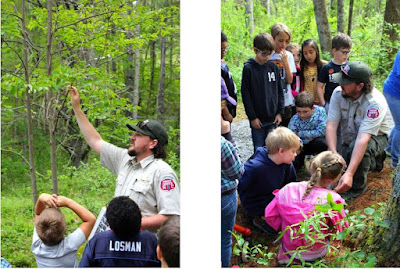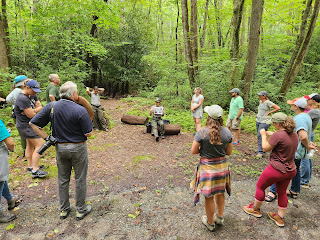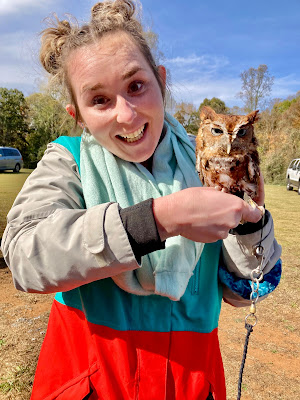
Nikki Jones, the Western North Carolina Region Director for Muddy Sneakers, was recognized today for completing her NC Environmental Education Certification. The presentation was part of a full morning of events at Polk Central Elementary, including a ribbon-cutting ceremony for a restored school nature trail and a special recognition for the school.
Muddy Sneakers is a non-profit organization that provides outdoor science education programs to fifth-grade public school students across the state. The NC Environmental Education Certification program is administered by the NC Department of Environmental Quality’s Office of Environmental Education and Public Affairs. The nature trail project and new educational programs at the school were part of Jones’s required 200 hours of workshops, field studies, teaching and community project that are required for the program.
Jones’s certificate was presented by Lisa Tolley, the program manager for the Office of Environmental Education and Public Affairs. Polk Central principal Dr. Kim McMinn attended to congratulate Jones, as well as representatives from project partners which included Conserving Carolina, Polk County Parks and Recreation and RootEd/Constructive Learning Design. The trail project is one of three Polk Central initiatives with RootED, a nonprofit program that helps educators design and deliver project-based and experiential learning. The Polk Central fifth-grade students and several parents, faculty and community members were also on hand for the event.
 |
| Nikki Jones and Lisa Tolley |
In addition to the honor for Jones and the trail project, the Great Trails State Coalition presented Polk Central with a certificate designating it a “North Carolina Great Trails School” for their efforts in restoring the nature trail. The school trail will now become part of the county’s public trail network.
 |
| Andrea Walter and Principal, Dr. Kim McMinn |
"I am very proud of our Polk Central Elementary students for taking on this challenge, and for doing an incredible job with the trail,” notes Polk County Schools Superintendent Aaron Green. “Real world learning opportunities make a huge impact on young people, and we are thankful for our community partners and donors who help make these experiences possible. I commend our educators for their emphasis on environmental education, and for helping our students understand that working together to appreciate and preserve our natural resources benefits us all. Thank you, Polk Central students, teachers, and community!"
Jones’s project originated from the longtime educational partnership between Muddy Sneakers and the school’s 5th grade. When she heard that Polk Central’s fifth grade teacher Andrea Walter was looking for help to replace the old tree identification signs on the school’s nature trail, she suggested they collaborate on a bigger project with the fifth-grade students. The Polk Central nature trail had become overgrown and underused, with its old interpretive signs lost, damaged or hidden in new forest growth. Walter wanted to restore the trail for both school and public use, as the immediate area has limited public nature access.
Students, families and community members worked together to rebuild the trail, remove several species of invasive plants and improve the trail’s surface for rainwater runoff. Jones worked with teachers to lead lessons and activities based on the trail and project, design tree identification signs and guide development of student-created virtual signs for the trail that are accessible through Google Maps. “This feature allows the interpretive information on the trail to grow and change over time. Trail users can access the interactive trail map on any device and customize their trail experience by selecting which themes to explore.” The trail is also interdisciplinary. Rebekah Morse, an English Language Arts and social studies teacher, worked with students to conduct community interviews on the history of Polk County which provides an additional layer for the virtual signage.
Jones emphasizes the active role of students on the project. “We worked with students to walk the trail, identify areas that needed repair, plan locations and content for physical and digital trail signs and develop the technology-enhanced trail experiences. Every step of the process was student-centered and aligned with 5th grade standards and project-based learning goals.”
To enhance the community aspect and ensure the success of the project, Jones and Walter connected the teachers and students with supporting organizations and agencies for help, including Conserving Carolina AmeriCorps members, the Kudzu Warriors and the Polk County Parks and Recreation to learn about and remove invasive plants. Students also worked with Ms. Kelly Gay of the Polk Soil and Water Conservation District to learn about how to address erosion on the trail.
Jones notes that the NC Environmental Education Certification Program not only led her to her project with Polk Central, but also enhanced her career. “It was helpful to reconnect with formal learning in the classroom environment and to build year-long relationships with students. It’s important for non-formal education partners to understand the work our fellow educators are doing in schools so that we continue to be strong, supportive partners in all our collaborations.”
Funders for this project included private donors and the Kiwanis Club of Tryon. Jones and the school also credit Polk County Schools Superintendent Aaron Greene and Ronette Dill, Grants & Community Partnerships Coordinator, for their support.
The NC Environmental Education Certification is offered through the Department of Environmental Quality’s Office of Environmental Education and Public Affairs to encourage professional development in environmental education and acknowledge educators committed to environmental stewardship. For more information, visit www.eenorthcarolina.org.
Governor Roy Cooper has designated 2023 as the Year of the Trail in North Carolina. Learn more about this effort and the Great Trails State Coalition at www.greattrailsnc.com.













































